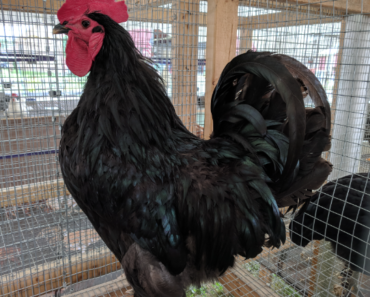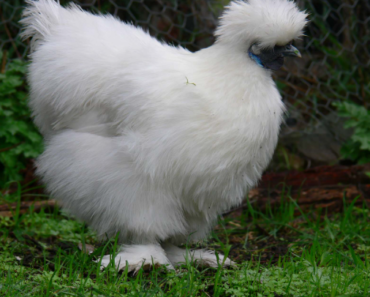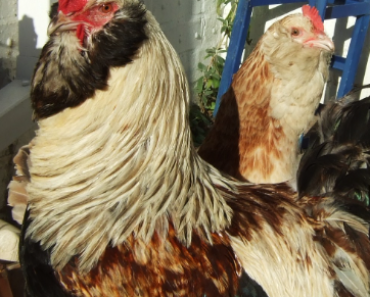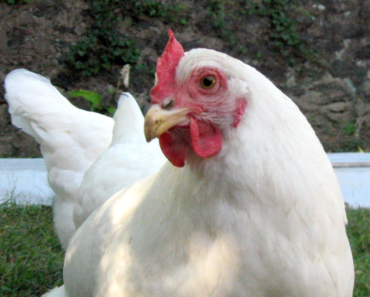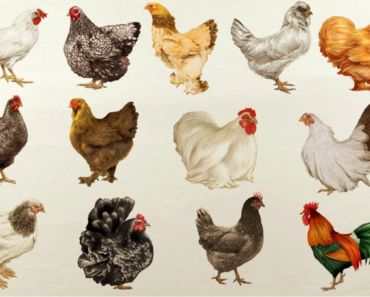Contents
- 1 Discover the Heritage and Characteristics of Plymouth Rock Chickens: A Staple Breed in the World of Poultry
- 2 The History of Plymouth Rock Chicken
- 3 FAQ
- 3.1 What are the key characteristics and temperament of Plymouth Rock chickens that make them a popular choice for chicken enthusiasts?
- 3.2 How does the egg production of Plymouth Rock chickens compare to other breeds commonly used for egg-laying purposes?
- 3.3 What are some recommended care and management practices for raising Plymouth Rock chickens to ensure their health and productivity?
- 3.4 Related Posts

Discover the Majestic Plymouth Rock Chicken: A heritage breed with distinctive black and white plumage. Known for their friendly temperament and excellent egg-laying abilities, these chickens are a popular choice among backyard enthusiasts. Join us as we delve into the fascinating history and unique characteristics of this beloved breed. Get ready to fall in love with the Plymouth Rock chicken!
Discover the Heritage and Characteristics of Plymouth Rock Chickens: A Staple Breed in the World of Poultry
Plymouth Rock chickens, also known as Barred Rocks, are a staple breed in the world of poultry. They have a rich heritage and distinct characteristics that make them highly valued by chicken enthusiasts.
Dating back to the 19th century, Plymouth Rock chickens were first developed in the United States. They were bred by crossing various breeds, including Dominiques, Black Javas, Black Cochins, and perhaps even Malays. This careful selection resulted in a breed that excelled in both meat production and egg laying.
One of the most recognizable features of Plymouth Rock chickens is their distinctive barred feather pattern. The feathers are primarily black with white stripes, giving them a striking appearance. This pattern is present in both males and females, which makes them easily distinguishable.
In terms of temperament, Plymouth Rocks are known for being docile and friendly. They are calm birds that get along well with other breeds, making them an excellent addition to any backyard flock. Their easygoing nature also makes them a great choice for beginners or families with young children.
In addition to their pleasant temperament, Plymouth Rocks are reliable layers of brown eggs. Hens typically start laying eggs around 5-6 months of age and can produce 4-5 eggs per week. This steady egg production, combined with their meaty build, makes them a practical choice for homesteaders or small-scale farmers.
Overall, Plymouth Rock chickens are a versatile and beloved breed in the world of poultry. Whether you are looking for a friendly backyard companion, a consistent egg layer, or a dual-purpose bird for meat and eggs, the Plymouth Rock is a breed worth considering.
The History of Plymouth Rock Chicken
Plymouth Rock chickens are a popular breed known for their versatility and hardiness. we will delve into the rich history of the Plymouth Rock chicken.
Origins
The Plymouth Rock chicken breed was developed in the United States in the mid-19th century. It was first bred in Massachusetts, specifically in the town of Plymouth, hence its name. The breed is a result of crossbreeding various breeds like Dominiques, Black Javas, and Cochins.
The goal was to create a chicken breed that had both good meat and egg-laying capabilities while being resilient to the harsh New England climate. The breed’s popularity quickly spread across the country due to its desirable traits, and it became a favorite among farmers and backyard chicken enthusiasts.
Characteristics
Plymouth Rock chickens are well-known for their versatility and adaptability. They have a medium-to-large size, with hens weighing around 6-7 pounds and roosters reaching 8-9 pounds.
They have a single comb and come in various colors, with the Barred Plymouth Rock being the most common. Barred Plymouth Rocks have alternating dark and light stripes on their feathers, giving them a beautiful and distinctive appearance.
These chickens are also renowned for their friendly and docile nature, making them excellent additions to any flock. They are generally hardy birds, able to tolerate both cold and hot climates. Their adaptability to different living conditions makes them suitable for both rural and urban environments.
Uses and Popularity
Plymouth Rock chickens are considered dual-purpose birds, meaning they are valued for both their meat and egg production. They are reliable layers, consistently producing large brown eggs throughout the year.
The meat of Plymouth Rock chickens is tender and flavorful, making them a preferred choice for home-raised poultry. Their size also lends well to the dinner table, providing ample meat for a family meal.
Due to their versatility and easygoing nature, Plymouth Rock chickens have gained popularity among chicken enthusiasts and small-scale farmers. They are also commonly used in educational settings to teach children about raising chickens and sustainable farming practices.
FAQ
What are the key characteristics and temperament of Plymouth Rock chickens that make them a popular choice for chicken enthusiasts?
Plymouth Rock chickens are a popular choice for chicken enthusiasts due to their key characteristics and temperament. Here are some reasons why they are favored:
1. Hardiness: Plymouth Rocks are known for their strong immune systems and ability to adapt to different climates. They are resilient and can withstand harsh weather conditions, making them a great choice for backyard chicken keepers.
2. Egg production: These chickens are excellent layers, consistently producing large brown eggs. On average, a Plymouth Rock hen can lay around 200-280 eggs per year, making them a reliable source of fresh eggs for households.
3. Friendly temperament: Plymouth Rock chickens are generally docile and friendly towards humans, making them suitable for families and beginners. They are known to be gentle birds that can easily be tamed and handled. This makes them great companions for children and ideal for those seeking a pet-like chicken breed.
4. Good foragers: Plymouth Rocks have a natural instinct for foraging and are skilled at finding their own food sources in the yard. They are known for their strong scratching abilities, which helps them find bugs, worms, and other insects, making them valuable for pest control in gardens.
5. Attractive appearance: Plymouth Rocks have a distinctive and eye-catching appearance. They come in two main color varieties: Barred and White. The Barred Plymouth Rock is characterized by black and white stripes, while the White Plymouth Rock is solid white. Their feather patterns make them visually appealing and a favorite among chicken enthusiasts.
Overall, Plymouth Rock chickens possess a combination of traits that make them a popular choice among chicken enthusiasts, including their hardiness, high egg production, friendly temperament, foraging abilities, and attractive appearance.
How does the egg production of Plymouth Rock chickens compare to other breeds commonly used for egg-laying purposes?
The egg production of Plymouth Rock chickens is generally considered to be moderate to high compared to other breeds commonly used for egg-laying purposes. Plymouth Rocks are classified as dual-purpose chickens, meaning they are suitable for both meat and egg production. While they may not excel in egg production as much as specialized egg-laying breeds such as Leghorns or Rhode Island Reds, Plymouth Rocks still have respectable egg-laying abilities.
On average, a Plymouth Rock hen can lay around 200-280 eggs per year. This number may vary depending on factors such as diet, housing conditions, and individual genetics. The size of the eggs produced by Plymouth Rocks is generally medium to large, with a brown shell color. Their eggs are known for their excellent flavor and quality.
Plymouth Rock chickens are favored by many backyard chicken keepers due to their friendly temperament, cold-hardiness, and adaptability to various climates. They are also known to be excellent foragers, which can reduce feed costs and contribute to overall sustainability in small-scale operations.
While Plymouth Rock chickens may not match the egg production levels of specialized egg-laying breeds, they still offer a good balance of egg-laying capabilities and other desirable traits, making them a popular choice for backyard flock owners.
What are some recommended care and management practices for raising Plymouth Rock chickens to ensure their health and productivity?
Proper nutrition: Provide a balanced diet that includes high-quality chicken feed. It should contain essential nutrients like proteins, carbohydrates, fats, vitamins, and minerals. Additionally, offer access to clean water at all times.
Comfortable housing: Provide a spacious and well-ventilated coop for the Plymouth Rock chickens. The coop should be secure from predators and have appropriate bedding such as straw or wood shavings.
Regular cleaning: Clean the coop regularly to maintain hygiene and prevent the buildup of harmful bacteria. Remove soiled bedding, droppings, and any leftover food.
Disease prevention: Vaccinate the Plymouth Rock chickens against common poultry diseases. Regularly inspect them for any signs of illness or parasites and take necessary actions promptly.
Exercise and free-ranging: Allow Plymouth Rock chickens to exercise and forage freely whenever possible. This helps them maintain their physical health, mental stimulation, and promotes natural behaviors.
Egg collection: Collect eggs daily to ensure they remain clean and minimize the risk of damage or breakages. Provide suitable nesting boxes with soft bedding for the hens to lay their eggs.
Regular monitoring: Observe the Plymouth Rock chickens for any unusual behavior, changes in appetite, or signs of distress. Early detection of issues allows for timely intervention.
Social interaction: Provide opportunities for social interaction among the chickens. Plymouth Rocks are known for their friendly and docile nature, and having companions can contribute to their overall well-being.
Protection from harsh weather conditions: Ensure proper insulation and ventilation in the coop to protect Plymouth Rock chickens from extreme heat or cold. Provide shade, shelter, and fresh water during hot weather, and add bedding or extra heat sources during cold winters.
Remember, these are just general care and management practices, and it’s important to customize them based on the specific needs and conditions of your flock. Consulting with experienced poultry farmers or veterinarians can also provide valuable insights.
Plymouth Rock chickens are an iconic breed in the world of chicken enthusiasts. With their striking appearance and friendly temperament, they make a great addition to any backyard flock. Whether you’re looking for a reliable egg layer or a beautiful show bird, the Plymouth Rock is a versatile choice. This breed’s hardy nature and adaptability to different climates further add to their appeal. So, if you’re considering adding to your flock, don’t overlook the Plymouth Rock chicken as a fantastic option to consider.

